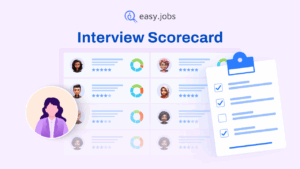Have you been wondering if you should employ an HR business partner and whether it would benefit your business? Many large companies around the world seem to think so, as most are hiring experienced business partners in HR to align their talent acquisition strategies with their overall business growth objectives for the best outcomes.

HR business partners must have a good grasp of the principles of recruiting, managing, and supporting employees in an organization. This important role requires an experienced individual who knows how your business works in-depth and what is needed to be done to hit all financial and operational goals. And so, this strategic role comes with a unique set of responsibilities and skills.
In this blog, we will walk you through what an HR business partner is, and how to differentiate them from HR managers in your company. We will also help explain what skills and responsibilities these business partners need to take on to help take your company closer to success. So without further ado, let’s dive in and analyze whether employing a business partner in human resources is the best strategy you can take.
What Is The Role of a Human Resource Business Partner?
An HR business partner (HRBP) is a highly experienced human resource professional who acts as a business liaison with an organization’s senior management to establish and direct a proper HR strategy that supports the organizational goals.
While the rest of the HR team works as part of an internal department, an HRBP is expected to sit on the board of directors or collaborate regularly with the C-suite. This collaboration often includes strategic alliances with fractional CHRO consulting firms, which can provide specialized expertise and support to enhance the effectiveness of HR strategies aligned with top-level business goals.
The HRBP then works as a direct link between the organization’s leaders and the HR department and is responsible for aligning business objectives with the employees and management. More specifically, they are tasked with helping the managers implement high-performing, integrated human resources practices.
Difference Between An HR Business Partner & An HR Manager
Now you must be wondering what’s the difference between an HR business partner and an HR manager. Well, while they sound very similar, a human resource business partner and a manager, both are separate roles and represent two different models of conducting HR services within an organization.
The HRBP is not in charge of a department’s administrative responsibilities. As previously mentioned, their primary responsibility is to work with the company’s senior leadership team while closely collaborating with the HR department. They are usually involved in building HR strategies that affect the entire firm, such as creating a plan to hire the right candidates with the abilities required for a specific job opening.
On the other hand, a traditional HR manager focuses on the recruitment, hiring, management, and termination of employees – overseeing policy implementation and other day-to-day administrative responsibilities in the internal human resource department.
According to the Society for Human Resource Management, there are some notable differences between the role of HR business partner and other HR roles, like manager or director.
💼 The HR director serves in an executive position and creates policies in areas such as productivity, discipline, benefits, payroll, and compliance.
💼 The HR manager has day-to-day responsibility for enforcing human resources policy. During hiring, an HR manager would help business units decide which candidate to hire for a given role.
💼 An HR business partner has a comprehensive understanding of and expertise in how the HR functions can make a company successful. They usually need to coach executives about strategic planning, developing supportive HR and organizational strategies, analyzing talent requirements, recruiting and onboarding, and more.
Important Responsibilities An HR Business Partner Must Take
An HR business partner has a better idea of the context surrounding each job opening and has to make decisions from an operational and strategic resource position. In essence, the HRBP is an adviser and consultant to business leaders on issues pertaining to human resources and employees. Hence, they usually have some important set of responsibilities and tasks to undertake.
-
Establish Relationships With The Business Leaders
These days, the HR business partner is often seen to take part in the board of directors committee and deal closely with the C-level business leaders of a company. So, first and foremost, the HRBPs need to establish a good relationship with the leaders as well as all the managers of the company. That way, he or she will be able to synchronize the HR strategy with the overall business strategy with different management teams and ensure all department goals are achieved smoothly.
-
Strategic Control Of The HR Processes
HRBPs need to be prepared to foresee any hurdles regarding human resources early on in order to run efficient, smooth recruiting and hiring processes. Beyond that, they are required to report & analyze the state of the employees in the company, create plans for in-& outsourcing during recruitment to find the best candidates, plan in advance to reduce retention rates, and organize the policy for compensation & benefits, among many other tasks.
-
Collaborate With Other HR Executives For Recruitment
The HRBP will have to be aware of the recruitment processes in detail and know how many new employees will need to be hired or which skills are lacking within the team. Then, he or she should create a foolproof plan with the HR executives to hire the best candidate for your company.
At the same time, the HR business partner should constantly monitor the HR budget of your company and prepare the redistribution of funding or allocate salaries to high-priority roles or departments as needed.
-
Plan & Prepare Staff Development Strategies
Once the recruitment process is over, it is the HRBP’s task to ensure the employees are working properly in their respective departments to take the company forward. Since the HRBP works closely with both the leading C-suite as well as the employees, they have an in-depth knowledge of what the board of directors wishes to see and what works for the employees. Therefore, the human resource business partners are sometimes required to provide professional development and training initiatives for managers and employees alike.
-
Enhance Company Brand To Drive More Business
One of the main focuses of business partners in Human Resources should be to enhance the company brand and ensure its growth. It is expected of an HRBP that he or she will be able to leverage employees as brand ambassadors and display an excellent work environment within your company to the rest of the world.
With proper company branding, the business partner will not only be able to help attract and select the best new candidates for your company but also drive more business from potential clients and users.
Fundamental Skills An HR Business Partner Needs For Success
Now, let’s discuss what skills the Human Resource Business Partners are required to have to ensure they can successfully carry out their skills and take your company to newer heights.
-
Must-Have Proper Business Knowledge
As a senior, experienced HR professional, the business partner must have proper business knowledge of the market and industry of your company. This includes a strong understanding of the business functions. An HRBP should know their business’ competitive advantage, competitors and their product(s), technology, and market share. They are also expected to be experienced with preparing proper data and analyses of recruitment, employee development, and productivity, and support the company with data-driven decisions.
-
Exceptional In Networking & Communication
Individuals in this particular business partner role must be adept at communication with both the business leaders and the other employees of the company. They must be skilled at networking and communicating in any situation, ranging from executive presentations to negotiations to the occasional conflict or crisis scenario.
The HR business partner needs to communicate with the leaders regularly to understand the needs of their business and to build rapport with the key decision-makers. All the while, also building a network of human resources peers who can provide professional advice and a network of individuals who would add value to the company as potential hires.
-
Be Skilled In Critical Thinking & Organization
An HRBP’s tasks are mostly based on creating strategic decisions upon discussion with the company leaders and the heads of the different departments. As a result, the business partner must have strong critical thinking and organizational skills to formulate proper strategies and processes. It is important that an HR business partner can provide you with sensible advice, well-thought-out solutions, and fair evaluations at every step of a business decision.
-
Be A Pro In Digital Acumen & Knowledge
It is extremely important that HR business partners be proficient in digital acumen and knowledge, to do their tasks with high efficiency and with proper execution.
Business Partners in HR need to have a wide range of software products at their disposal to help develop the best HR strategy, manage individuals and teams, and track finances well. They also have to be prepared to create proper data analysis and help HR departments with tasks such as evaluating job candidates, assessing staffing needs, and monitoring employee productivity and other job performance metrics.
-
Identify What Requires Change & Development
It’s important that HRBPs be able to identify which sectors of your company require large-scale or radical changes well in advance and develop strategic plans with the least disruptive impact on the organization and its employees.
At the same time, it is quite imperative that Human Resource business partners be able to identify talented employees and develop leaders within your organization. All leaders should be evaluated based on how their expertise and performance align with overall business objectives.
Best Practices To Implement With A Business Partner In HR
To garner the highest positive benefits, you need to implement the business partnership correctly. Some of the best practices for a successful implementation are:
💼 Choose an HRBP from within your company if possible. Although not always necessary, this individual will have the best knowledge of your business structure and what needs to be done to improve it.
💼 Make sure the HRPB that you choose has all the skills mentioned above to perform the required tasks, and more.
💼 Evaluate the HR professionals as business partners with a set of critical thinking questions and ensure they will be able to bring unique information, insights, and recommendations to deliver a competitive advantage for your company.
Reach Your Business Goals Quicker With An HR Business Partner
We can, therefore, conclude that HR business partners bring success to companies by focusing on both the betterment of the business as well as the employees, in the logic, research, and processes of human and organization optimization.
What do you think? We hope this blog was helpful to you in deciding whether to employ a new human resource business partner to reach all your business goals more easily. Let us know by commenting below; we would love to hear from you. For more tips on recruitment and hiring, make sure to subscribe to our blog or join our friendly Facebook community to get all the latest updates.













